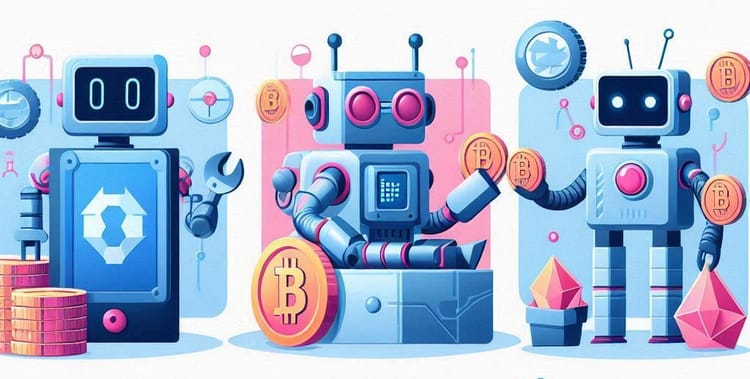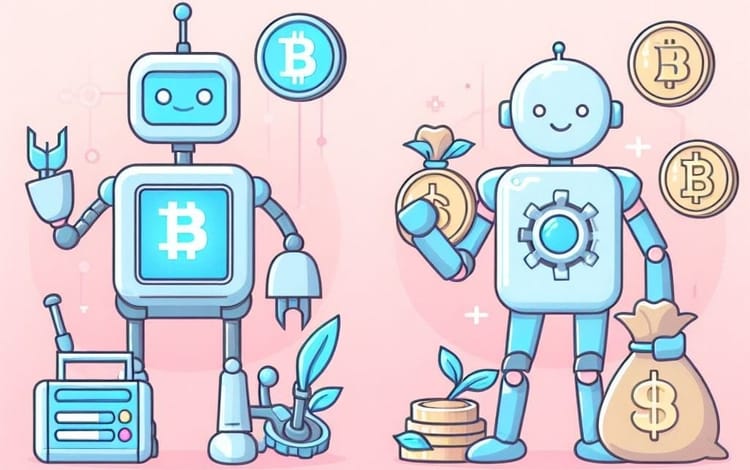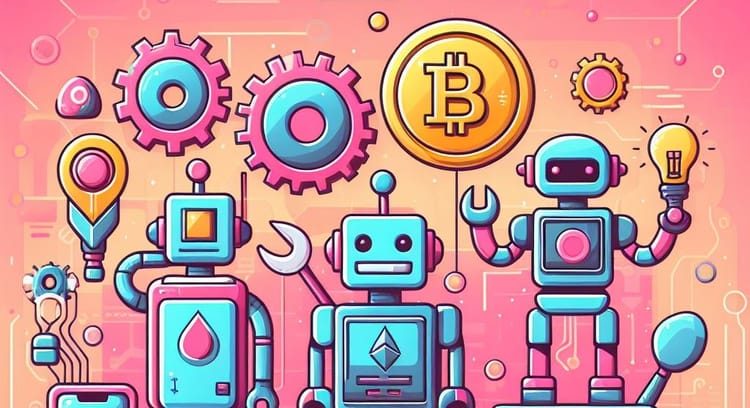Last Fortnight in Web3 and AI

Hello again, everyone, and welcome to all new subscribers 🤩
This is the Web3 + AI newsletter, where we explore the intersection of blockchain and artificial intelligence. Today's edition features concise updates from startups leveraging these two technologies, as well as a selection of compelling reading and news pieces from the last fortnight. That format will take turns with deeper analyses into particular Web3 + AI use cases, so stay tuned for those too.
Thank you for being here! Let's dive in!
What's New in the Web3 + AI Startup World?
Modulus Attracts $6.3M to Secure On-Chain AI
Modulus is a brand-new start-up that leverages cryptography and zero-knowledge-proof technology to keep powerful AI algorithms accountable. Their Seed round took place only weeks ago, and was backed by Variant, 1kx, and others:
Ecstatic to announce our $6.3M Seed round today, co-led by @1kxnetwork & @variantfund 🎉
— Modulus (@ModulusLabs) November 1, 2023
With participation from prominent funds & angels, we're building Modulus: the 𝗔𝗰𝗰𝗼𝘂𝗻𝘁𝗮𝗯𝗹𝗲 𝗠𝗮𝗴𝗶𝗰 company🪄
How does specialized ZK bring AI on-chain?https://t.co/QNYHKr3WsQ pic.twitter.com/AfJa0OWKf8
The mission of Modulus is to integrate cryptographic security into AI, and thus, allow dApp builders to employ powerful AI features without risking centralization or security losses. Moreover, once large AI models get temper-prooved, they can easily be utilized in sensitive industries such as medicine, education, or finance.
The Modulus team claims their ZK prover is the world's first purpose-built for AI. They also promise to:
Debut the largest AI applications ever implemented on Ethereum via partnerships with Upshot, Worldcoin, Ion Protocol and others.
Looking forward to seeing what they will accomplish!
Ritual Raises $25M to Decentralize AI
Ritual is a representative of the huge wave of new modular blockchains seeking to integrate artificial intelligence and featuring an AI execution layer. The company, founded by former Polychain Capital partners and supported by Archetype, Accomplice and Robot Ventures, plans to address the centralized nature of the AI revolution that has unfolded this year.
Introducing Ritual – the global, sovereign execution layer for AI.
— Ritual (@ritualnet) November 8, 2023
We're excited to announce our $25m raise from @archetypevc @accomplices @robotventures @daofive and others, our vision, roadmap and our first product: Infernet. Read on to learn more:https://t.co/jzJUgzgiZN pic.twitter.com/ygRNTHPkyU
The team behind Ritual sees the present AI industry as oligopolistic and structurally misaligned, with high compute costs and limited hardware access. They argue that AI companies are forced to keep their models closed-source, since there is no monetization infrastructure in place to incentivize them to open source. I agree and am persuaded blockchain could help remedy that situation.
Here is how Ritual works:
Fundamentally, it is envisioned as an open, modular, sovereign execution layer for AI. Ritual brings together a distributed network of nodes with access to compute and model creators, and enables said creators to host their models on these nodes. Users are then able to access any model on this network—whether its an LLM or a classical ML model—with one common API, and the network has additional cryptographic infrastructure that allows for guarantees around computational integrity and privacy.
I am preparing a comprehensive comparative analysis on newly launched modular chains and their characteristics. Expect it soon!
Galxe to Add OpenAI's GPT 3.5-Powered AI-Assistant
Galxe, the Web3 community-building and loyalty platform, is pivoting to AI. The company announced the launch of Galxe AI, an interactive assistant to help users navigate the often confusing world of Web3 projects.

In practice, Galxe has partnered with Alva to deliver "the most crypto-savvy chatbot" where users can inquire about the various projects and NFT collections supported by the network. It is supposed to come to life in December.
The Graph to Feature AI-Assisted Querying
The Graph, the blockchain data indexing protocol, released its new roadmap last week. It envisions delivering a rich market of data, serving novel use cases for data scientists, and providing support for Large Language Models (LLMs). Moreover, The Graph plans to employ LLMs to offer AI-assisted data querying:

Render to Build Largest AI Compute Cloud, Migrates to Solana
Render Network utilizes decentralized GPU-based resources for rendering next-generation 3D media. It recently partnered with io.net, another GPU DePIN (Decentralized Physical Infrastructure Network), to expand AI-focused GPU suppliers. They plan on doing that through an incentive program that will distribute up to $2.6M, paid in RNDR tokens, to newly onboarded GPU providers.
Today marks a new era for AI.@ionet_official is partnering with @rendernetwork to build the world’s largest AI compute cloud.
— io.net (@ionet_official) November 9, 2023
Up to $2.7 MILLION in incentives are available for new suppliers on the network.
Read more below
👇https://t.co/10JUM5edbv
Meanwhile, Render's core infrastructure was successfully moved from Ethereum to Solana, and the RNDR(ETH) tokens can now be migrated to RNDR(SOL). The switch was undertaken with the aim to expand Render Network's capabilities into new areas such as machine learning and inference training, as well as unlock new usefulness through Solana's technologies, like compressed NFTs, on-chain order books and real-time oracles.
Aethir Joins Nvidia's Inception Program, Launches Testnet
The decentralized cloud infrastructure (DCI) builder Aethir has recently announced its collaboration with one of the world's largest GPU manufacturers, namely Nvidia. By joining Nvidia's accelerator, Aethir will have a platform to connect with venture capitalists and increase its visibility through exclusive events, potentially attracting additional investment and partnerships.
🚀 BIG NEWS! We're proud to announce our collaboration with @nvidia's Inception program. @Aethir_ 's on a mission to redefine #gaming & #AI cloud interactions, and we're supercharged to join the program! Dive into our story on @VentureBeat by @deantak
— Aethir (@Aethir_) November 1, 2023
👉https://t.co/qxMPPE0NeD…
Additionally, the Singapore-based startup, whose objective is to speed up gaming and AI, launched a testnet on Arbitrum. "This is a significant milestone for Aethir and the Web3 cloud industry, as we march toward our goal of delivering a more equitable and developer-friendly Internet supporting the use cases of tomorrow", said Aethir's CTO Kyle Okamoto.
Aethir's flagship product, Aethir Atmosphere, introduces a GPU-as-a-Service ecosystem that targets to reward GPU providers for the use of their idle resources.
Web3 & AI Paired in Health Research
Rejuve.ai leverages decentralized artificial intelligence to democratize access to health monitoring and enhance longevity research. It is part of the SingularityNET ecosystem and is building a network of researchers, clinicians, and data contributors.

Here is how it works: everyone willing to grant the Longevity App access to monitoring their essential bodily metrics will receive RJV tokens as a reward. These tokens can eventually be used on the platform to buy supplements, medical tests, or therapies. The team behind Rejuve.ai targets to acquire data from Africa, Asia, and the Middle East, since current longevity studies count almost entirely on Western population data.

Noteworthy Podcasts, Articles, Events
AI & Crypto by Web3 with a16z Podcast
If you are still having trouble discerning how artificial intelligence and blockchain could converge and reinforce each other, I highly recommend you listen to this edition of the Web3 by a16z podcast. It is a fascinating conversation between Dan Boneh, a Stanford computer science and cryptography professor, and Ali Yahya, general partner at a16z crypto and former Google Brain core contributor. They go through numerous potential use cases of the Web3 and AI synergy, while also discussing possible challenges and obstacles to them functioning properly. Don't forget to let me know what you think afterward!
Emergen Research: Blockchain AI Market to Grow by 26%/Y
The global market of products and services combining blockchain and artificial intelligence will be growing by ~ 26% annually, according to a report by Emergen Research. It is expected to reach $3.5B by 2032. I guess we will have a lot to cover in this blog over the coming years! 😊Plus, if you read it regularly, you will see that one of Emergen's conclusion can be easily refuted. They claim that the market is fairly consolidated, with just a few players holding a major market share, but it is obvious this is no longer true.
EU AI Act May Not Pass
The AI Act - the European Union's landmark bill to regulate artificial intelligence, hit a deadlock last week and may not pass at all. The main stumbling block to reaching consensus turned out to be foundation models - a term coined to indicate powerful AI models capable of different tasks and trained on various data sources, like OpenAI's GPT 4 for instance. Countries like France, Germany, and Italy are against adopting any regulations of foundation models to protect their local entrepreneurs and businesses. Meanwhile, the EP declared that these particular dispositions are "a red line" and no agreement can be reached without them.
At the same time, the AI startup ecosystem in Europe fears that these new rules would hinder innovation and would induce even stronger centralization of power into the hands of the big names in the AI race.
Disclaimer: None of this should or could be considered financial advice. You should not take my words for granted, rather, do your own research (DYOR) and share your thoughts to create a fruitful discussion.








Member discussion